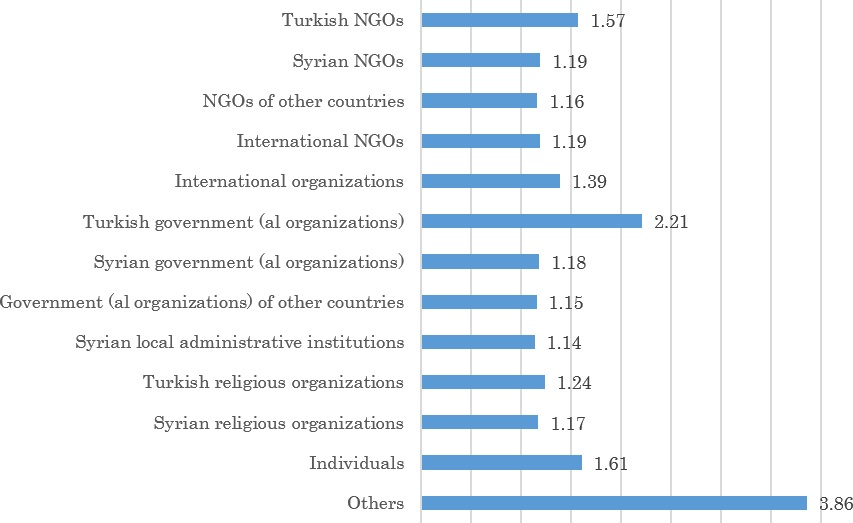CMEPS-J Report No. 52 (January 24, 2020)
Kohei IMAI (Institute of Developing Economies – JETRO)
Yutaka TAKAOA (Middle East Institute of Japan)
Shingo HAMANAKA (Ryukoku University)
Kota SUECHIKA (Ritsumeikan University)
Aiko NISHIKIDA (Keio University)
Dai YAMAO (Kyushu University)
Masaki MIZOBUCHI (Nagoya University of Commerce and Business)
Hiroyuki AOYAMA (Tokyo University of Foreign Studies)
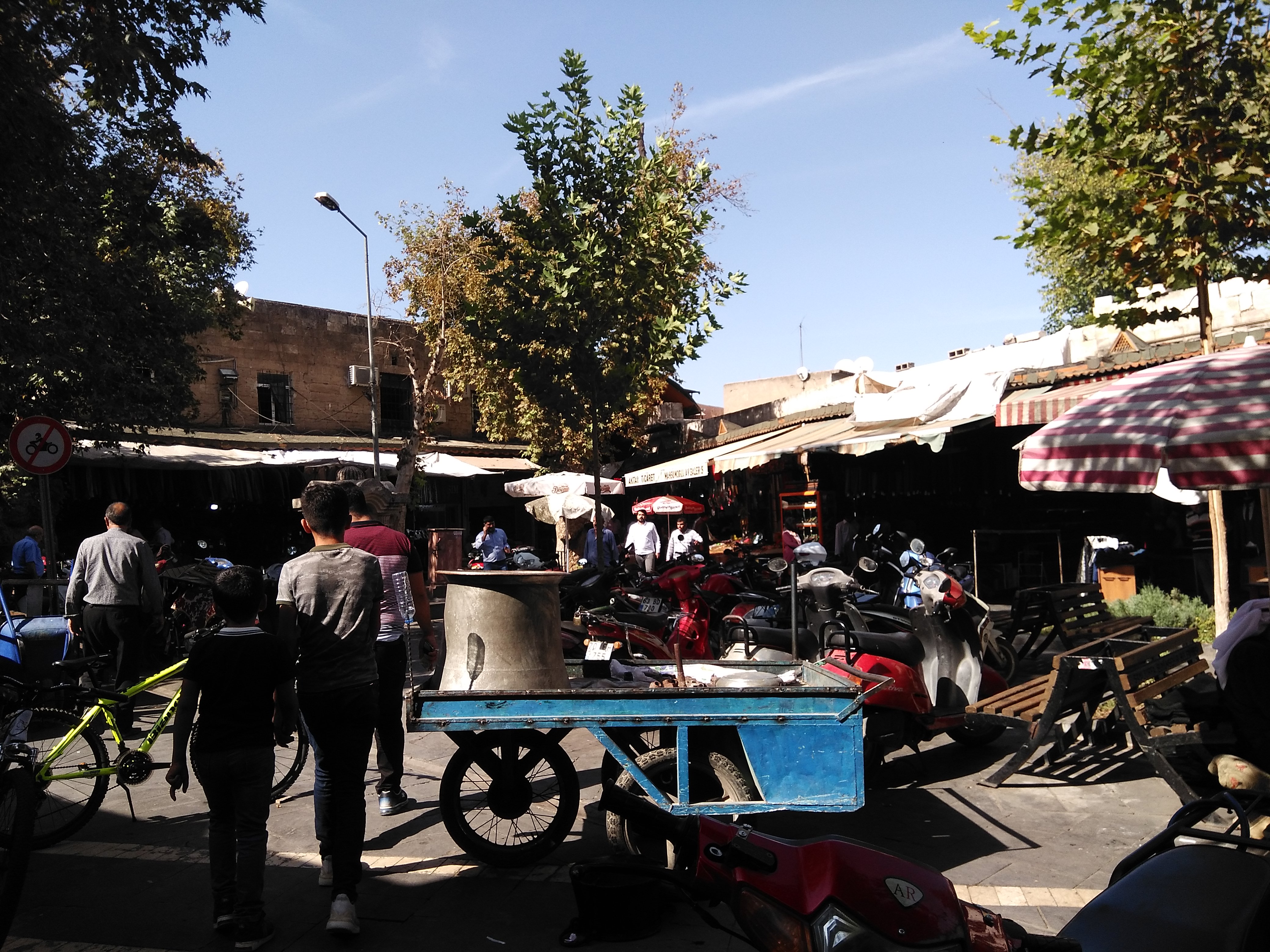
I. Purpose of Survey
“Middle East Opinion Survey (Syrian Refugees in Turkey 2019),” through the analysis of tally and quantitation of results of the opinion survey conducted on the Syrian refugees residing in Turkey, has the purpose of (1) grasping how the Syrian refugees view refugee assistance activities of donor countries and NGOs, and (2) proposing what contributions should be made to the politics, social economy and culture of host countries, among which is Turkey.
II. Cooperative Organization and Collaborative Research Projects
The survey was conducted with full support of Infakto Research Workshop (İnfakto Araştırma Danışmanlık Dış Tic.Ltd. Şti, Founding Parter: Güçlü Atılgan) in finalizing the contents of the questionnaire, sampling, conducting interviews with respondents and inputting data. Coordination with Infakto was made en bloc by Kohei IMAI (researcher at the Institute of Developing Economies – JETRO), who is the co-investigator in the project entitled “Roles of Informal Actors in Reconstruction and/or Destruction of the State: Case Studies of the Arab East”.
III. Method of Survey
1. Survey Schedule
- April 23 – July 29, 2019: preparation of a draft of the questionnaire by the members of the project “Roles of Informal Actors in Reconstruction and/or Destruction of the State: Case Studies of the Arab East”.
- August 7, 2019: formal agreement conducted between the project “Roles of Informal Actors in Reconstruction and/or Destruction of the State: Case Studies of the Arab East” and Infakto on conducting the suvey “Middle East Public Opinion Survey (Syrian Refugees in Turkey 2019)”.
- August 7 – October 28, 2019: preparation and coordination by Infakto for conducting the survey and finalizing the questionnaire.
- November 6 – November 28, 2019: the main survey conducted by Infakto in Adana, Gaziantep, Hatay, Mersin, İstanbul, Şanlıurfa, and Kilis provinces.
- December 6, 2019: completing data entry by Infakto.
2. Survey Subjects
A total of 1,217 Syrian refugees aged 18 to 70 years and residing in Turkey were selected to participate in the survey. 4 people who were over 71 years old, confirmed in the data cleaning process, and aggregation was done, including the data on these 4 people.
3. Survey Method
Door-to-door individual personal interview in Arabic.
4. Survey methods
According to the statistics of UNHCR, 3,576,659 Syrian refugees are living in Turkey (as of Janyary 9, 2020). In the survey, the following 7 provinces (22 districts), where 70 percent of them are hosted, were selected as self-representing units and define the number of samples (interviewees) proportionate to number of Syrian living there.
In the selected provinces, neighborhoods were selected with consultation which the local authorities, by fixing the number of interviewees conducted in each neighborhood with 12. In these neighborhoods, 3 streets are selected by using a Kish table and 4 interviewees are completed in each street through random walk.
SURVEY AREAS AND NUMBER OFSAMPLES (D.03)
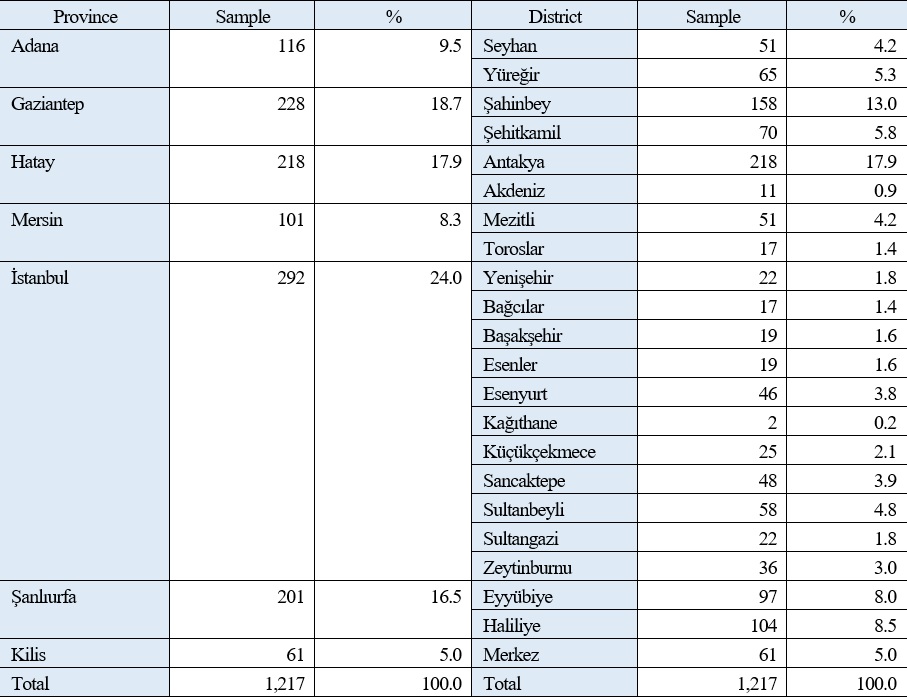
MAP
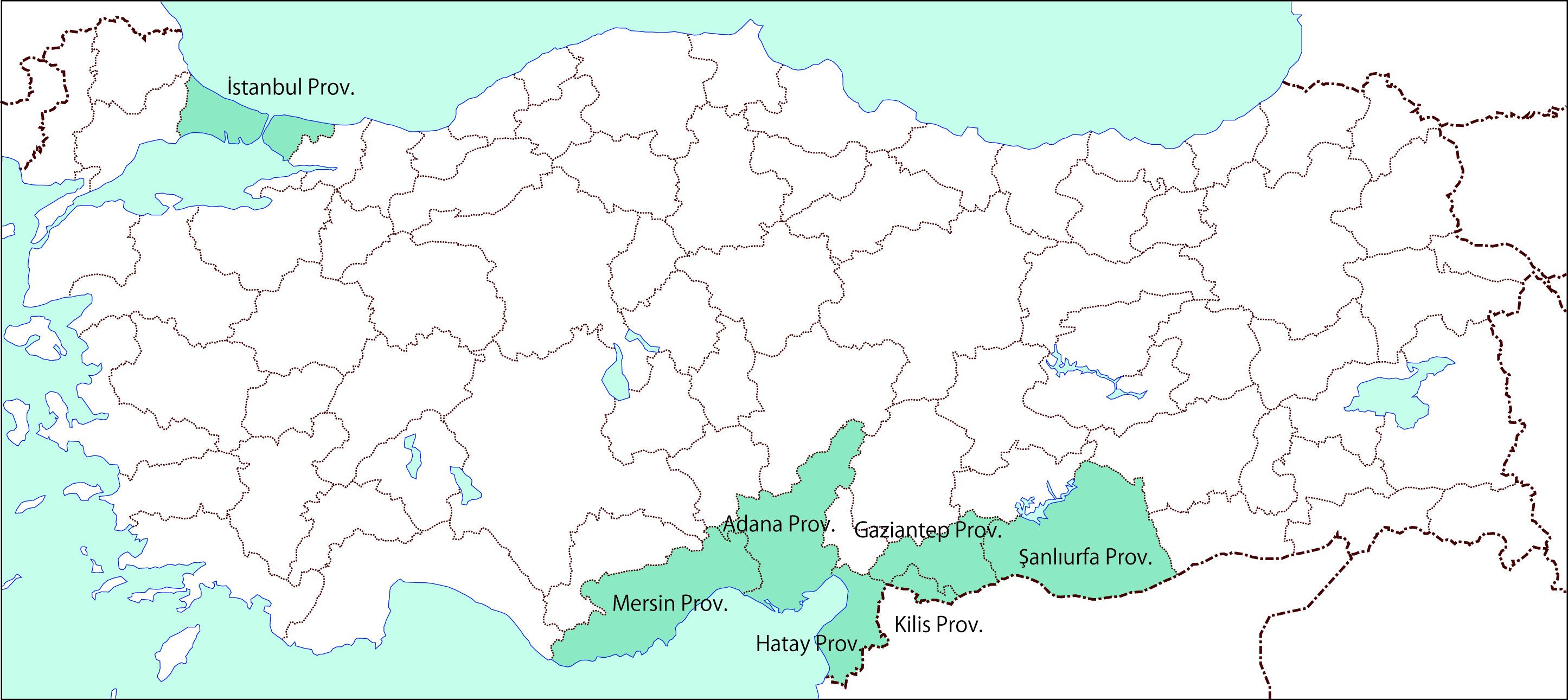
(Source) Drawn by Hiroyuki AOYAMA.
IV. Aggregate Results
D.01. Is it possible to inform us of date of birth?

D.02. Gender of the interviewee

A.01. Please put the following items in the order that you think should be prioritized in Syria.
First

Second
 Third
Third

Fourth

Score (The scoring was performed, converting “First” to 4 points, “Second” to 3, “Third” to 2, and “Fourth” to 1 point. “DA/refused” is processed as a missing value.)
A.02. Choose the three topics that you consider most important in the field of education.
 A.03. Choose the three topics that you consider most important in the field of construction/reconstruction.
A.03. Choose the three topics that you consider most important in the field of construction/reconstruction.

A.04. Choose the three topics that you consider most important in the field of economic promotion.
 A.05. Choose the three topics that you consider most important in the field of health medical.
A.05. Choose the three topics that you consider most important in the field of health medical.

A.06. Choose the three topics that you consider most important in the field of living condition improvement of Syrians living in Turkey.

A.07. To what extent have you got assistance so far from the following organizations in Turkey?
Turkish NGOs

Syrian NGOs

NGOs of other countries

International NGOs

International organizations

Turkish government (al organizations)

Syrian government (al organizations)
 Government (al organizations) of other countries
Government (al organizations) of other countries
 Syrian local administrative institutions
Syrian local administrative institutions

Turkish religious organizations

Syrian religious organizations
 Individuals
Individuals
 Others
Others
 Score (The scoring and average value were performed, converting “Very much” to 5 points, “Much” to 4, “Moderately” to 3, “Not so much” to 2, and “Not at all” to 1 point. “DA/refused” is processed as a missing value.)
Score (The scoring and average value were performed, converting “Very much” to 5 points, “Much” to 4, “Moderately” to 3, “Not so much” to 2, and “Not at all” to 1 point. “DA/refused” is processed as a missing value.)
A.08. Choose three topics that you believe are priority issues that Syrian civil society should address in Syria.
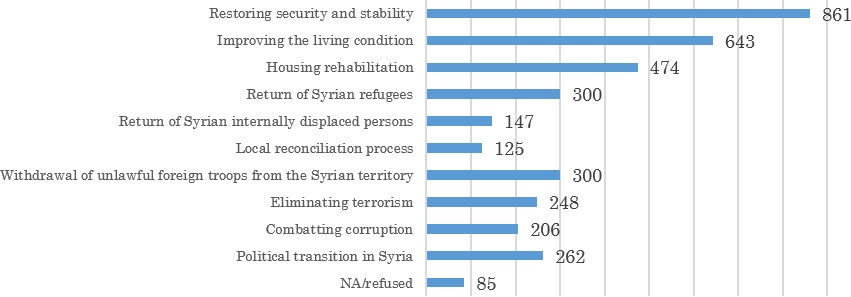
A.08a. Choose three topics from the question above in which you want to spontaneously participate.
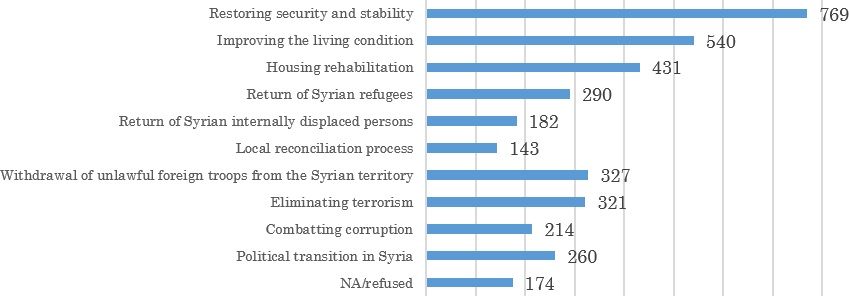
A.09. To what extent do you want the following countries to participate in the return of Syrian refugees?
The United States

Russia
 The United Kingdom
The United Kingdom
 France
France
 China
China
 Germany
Germany

Saudi Arabia
 Turkey
Turkey

Iran

Japan

Lebanon

Jordan

Qatar

Sweden
 North Korea
North Korea
 Syria
Syria
 Others
Others

Score (The scoring and average value were performed, converting “Very much” to 5 points, “Much” to 4, “Moderately” to 3, “Not so much” to 2, and “Not at all” to 1 point. “DA/refused” is processed as a missing value.)
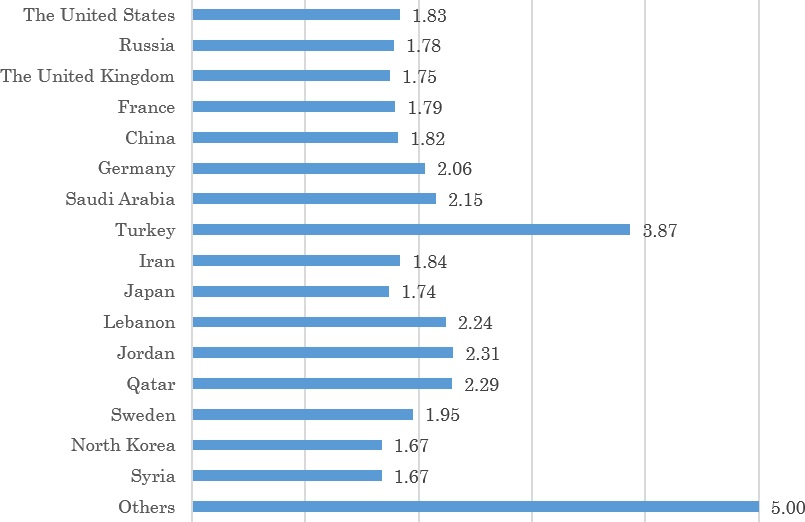
A.10. How optimistic or pessimistic are you about your economic and social condition three years from now compared to the current situation?

A.11. How satisfied are you with your current life compared to your life immediately after transfer to your current address (i.e., immediately after displacement)?
 A.12. To what extent are the following benefits important in changing your current residence?
A.12. To what extent are the following benefits important in changing your current residence?
Opportunity to obtain more income

Opportunity to utilize your talents

Opportunity to improve your talents

Better education for your children

Opportunity to improve your living condition

Securing personal safety
 Enhancement of social welfare
Enhancement of social welfare

Situation of lifeline such as water supply, electricity and gas

Housing situation
 Situation of social infrastructure such as schools and hospitals
Situation of social infrastructure such as schools and hospitals

Operational status of markets and logistics (accessibility in logistics)
 Your family, relatives, friends, and acquaintances are in that place
Your family, relatives, friends, and acquaintances are in that place

Living with your family
 Need for private space
Need for private space

Culture (in the place) is similar to yours

Language used (in the place) is your native language
 Religious allegiance
Religious allegiance

Political transition in Syria
 Free departure and immigration
Free departure and immigration
Guarantee not to participate in battle

Score (The scoring and average value were performed, converting “Very much” to 5 points, “Much” to 4, “Moderately” to 3, “Not so much” to 2, and “Not at all” to 1 point. “DA/refused” is processed as a missing value.)
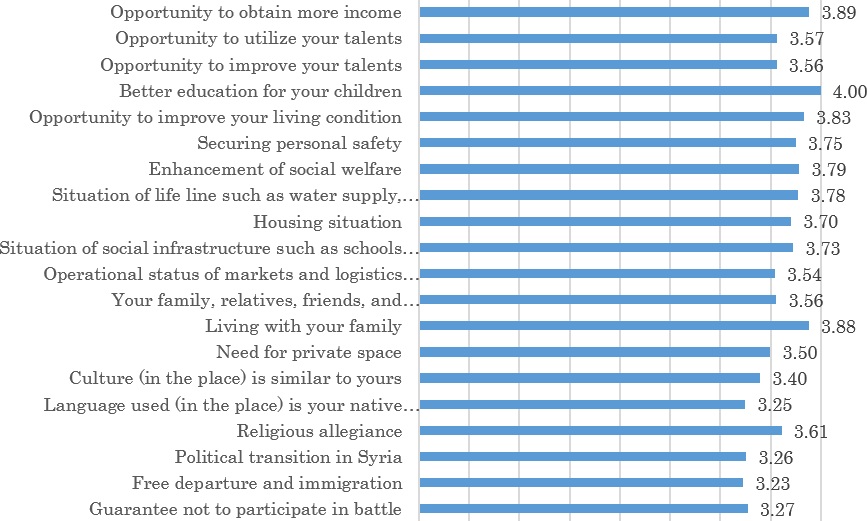
A.13. How seriously do you consider to return to Syria?
 A.14. To what extent do you want to live in the following areas in case you return to Syria?
A.14. To what extent do you want to live in the following areas in case you return to Syria?
Syrian government-controlled area

Opposition-held area in the de-escalation zones
 Opposition-held area not outside the de-escalation zones
Opposition-held area not outside the de-escalation zones
Kurdish nationalist controlled area

Others
 Score (The scoring and average value were performed, converting “Very much” to 5 points, “Much” to 4, “Moderately” to 3, “Not so much” to 2, and “Not at all” to 1 point. “DA/refused” is processed as a missing value.)
Score (The scoring and average value were performed, converting “Very much” to 5 points, “Much” to 4, “Moderately” to 3, “Not so much” to 2, and “Not at all” to 1 point. “DA/refused” is processed as a missing value.)

Personal Data
D.04.1. Since when do you live at this address?
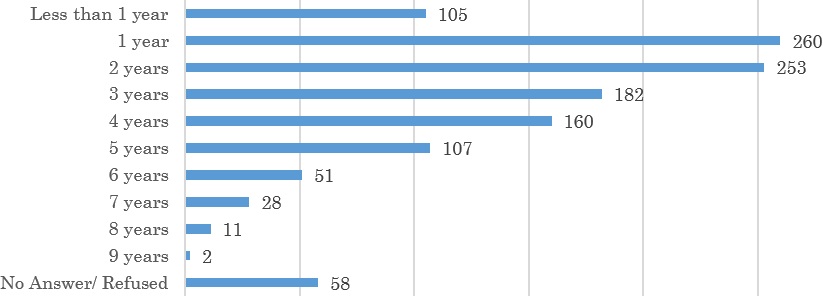 D.04.2. Since the crisis (2011) happened, how many times have you moved until you choose your current address?
D.04.2. Since the crisis (2011) happened, how many times have you moved until you choose your current address?
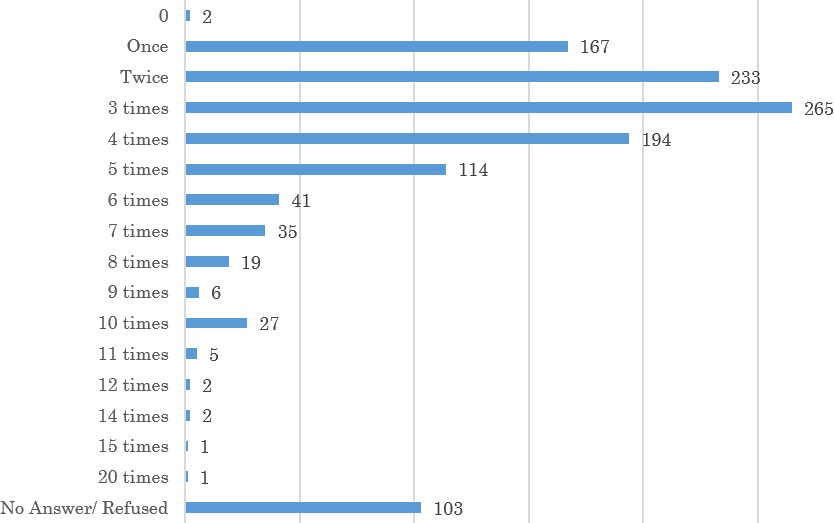 D.04.3. When were you transferred for the first time?
D.04.3. When were you transferred for the first time?
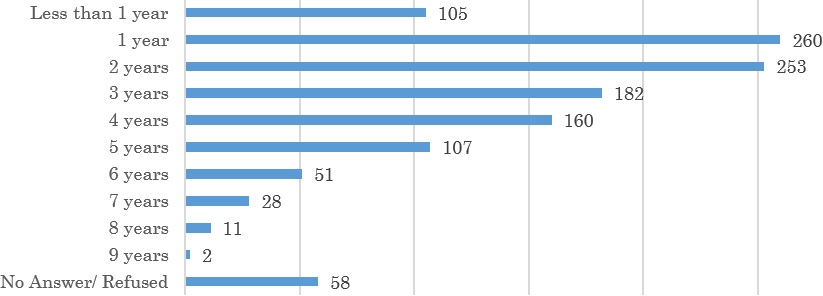
D.05. Birhplace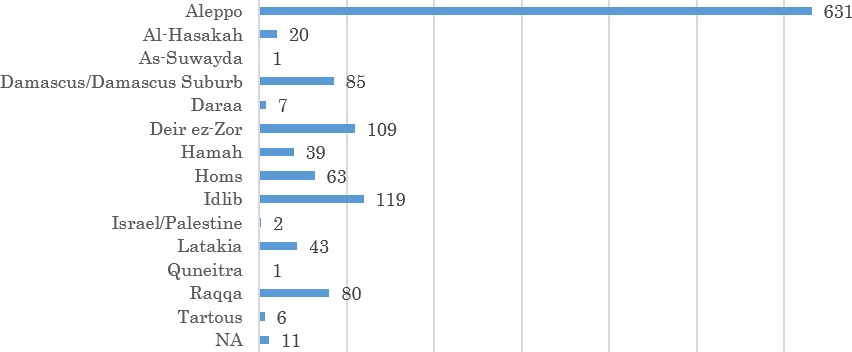
D.06.1. How many people lives in this house including yourself?
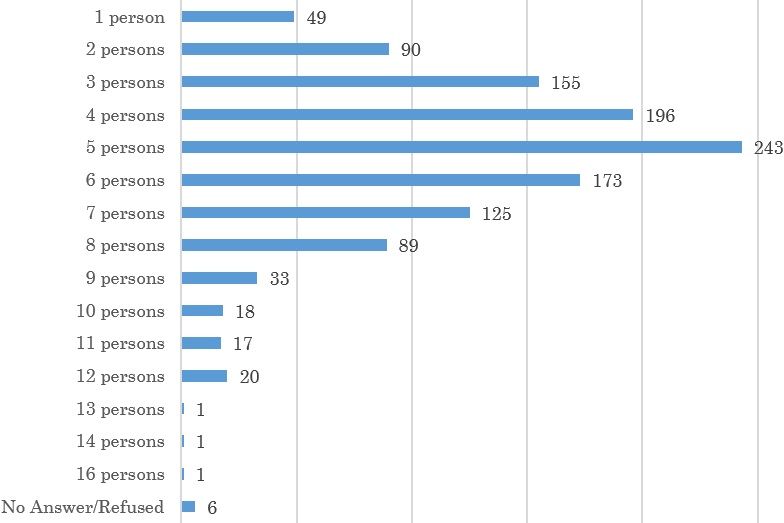 D.07. What is your current marital status
D.07. What is your current marital status
 D.08. How do you describe your religion?
D.08. How do you describe your religion?
 D.09. To what extent do you sympathize with the following principles/ideologies?
D.09. To what extent do you sympathize with the following principles/ideologies?
Arab nationalism
 Syrian nationalism
Syrian nationalism
 Kurdish nationalism
Kurdish nationalism
 Political Islam
Political Islam

Liberalism

Tribalism
 Secularism
Secularism
 Score (The scoring and average value were performed, converting “Very much” to 5 points, “Much” to 4, “Moderately” to 3, “Not so much” to 2, and “Not at all” to 1 point. “DA/refused” is processed as a missing value.)
Score (The scoring and average value were performed, converting “Very much” to 5 points, “Much” to 4, “Moderately” to 3, “Not so much” to 2, and “Not at all” to 1 point. “DA/refused” is processed as a missing value.)
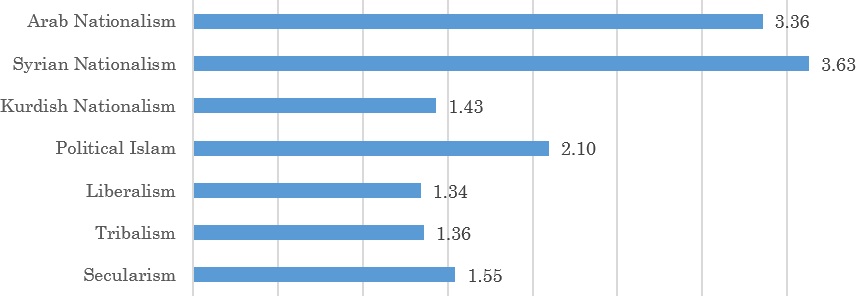 D.10.1. What is your native language?
D.10.1. What is your native language?
 D.10.2 To what extent do you understand and know (read and write) other languages than your native language?
D.10.2 To what extent do you understand and know (read and write) other languages than your native language?
Arabic
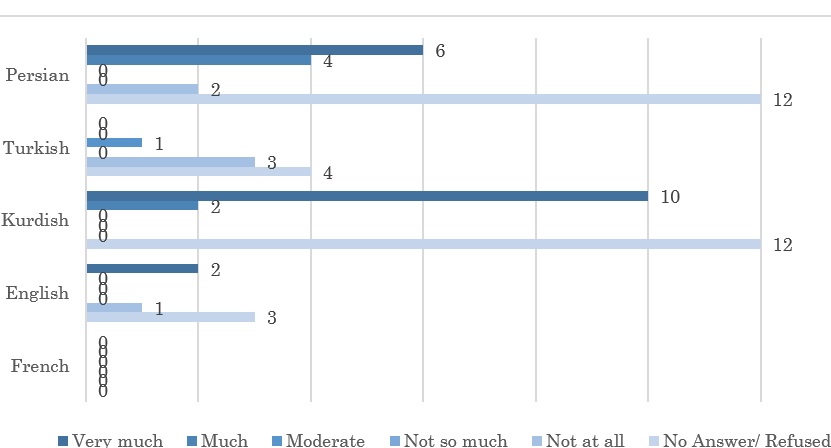 Persian
Persian
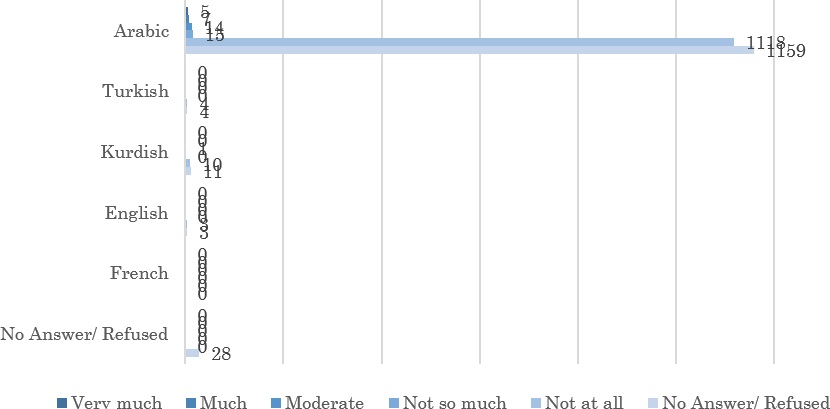 Turkish
Turkish
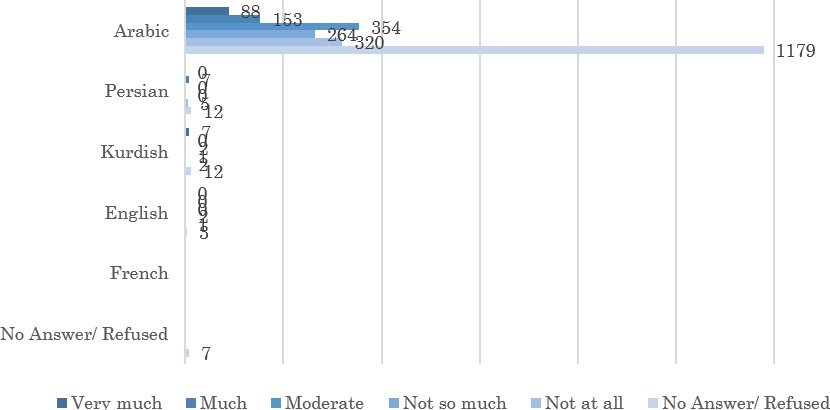 Kurdish
Kurdish
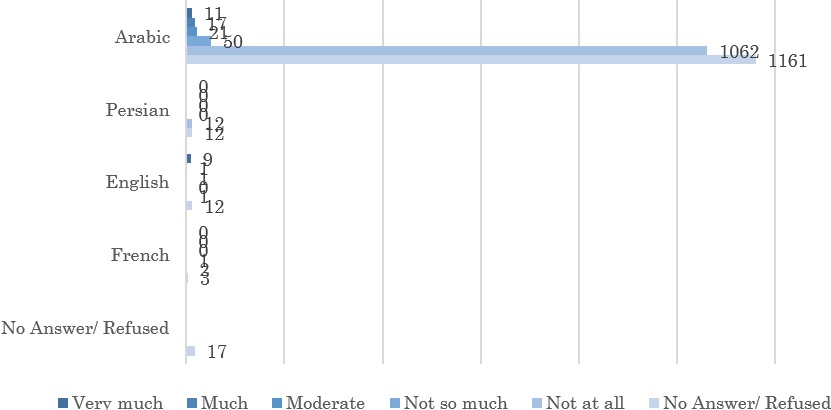 English
English
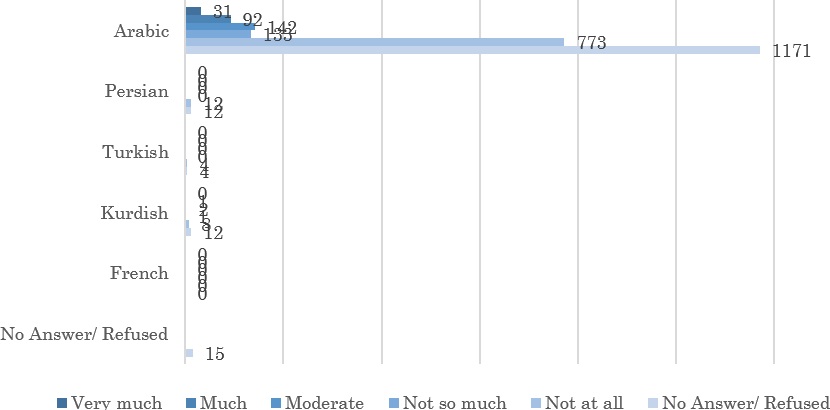 French
French
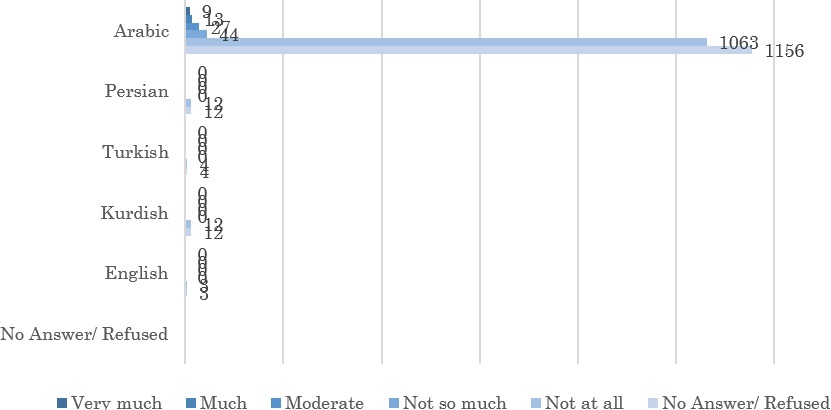 D.11. What is your highest education level?
D.11. What is your highest education level?
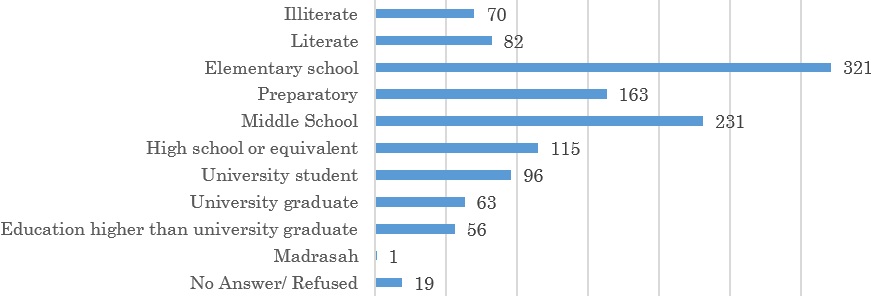 D.12. You are:
D.12. You are:
 D.13.1. Please answer about your current occupation (If you are engaged in multiple occupations, please answer about your most important occupation).
D.13.1. Please answer about your current occupation (If you are engaged in multiple occupations, please answer about your most important occupation).
What is the type of occupation?
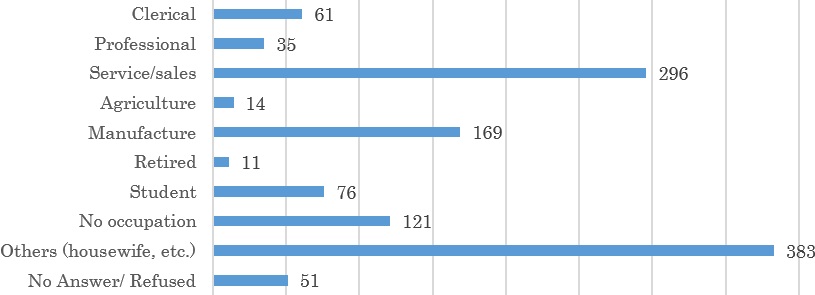 D.13.2. What is the type of employment?
D.13.2. What is the type of employment?
 D.13.3. Who is your employer?
D.13.3. Who is your employer?
 D.13.4. What is the sector?
D.13.4. What is the sector?
 D.13.5. What is the industry?
D.13.5. What is the industry?
 D.13.6. Since when have you worked for your current occupation?
D.13.6. Since when have you worked for your current occupation?
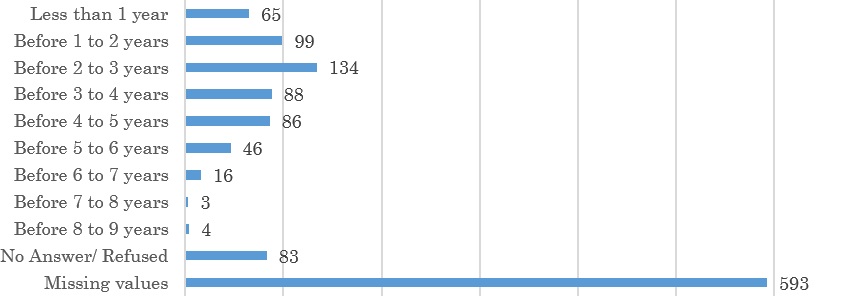 D.13.7. The following is the classification of your monthly income. To which group do you belong? Please answer the average amount earned last year, including income, pension, and so on.
D.13.7. The following is the classification of your monthly income. To which group do you belong? Please answer the average amount earned last year, including income, pension, and so on.



